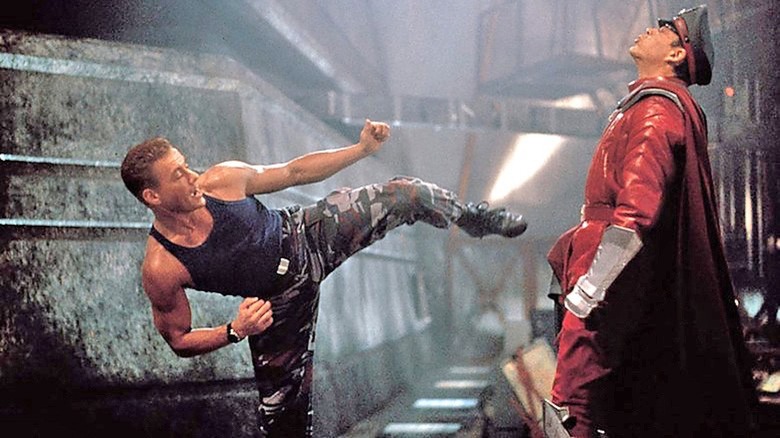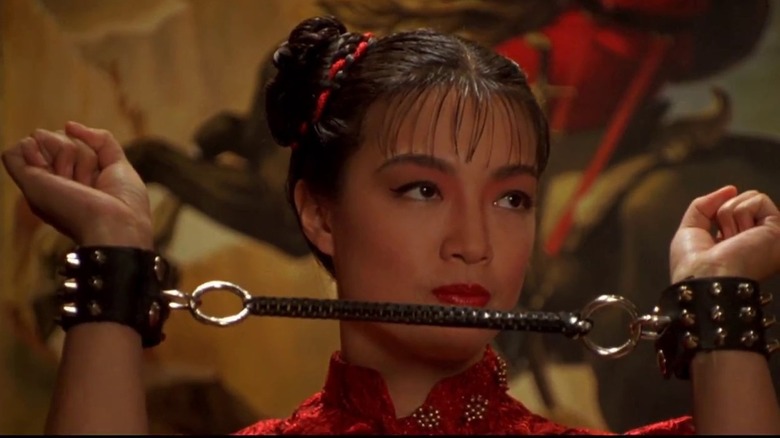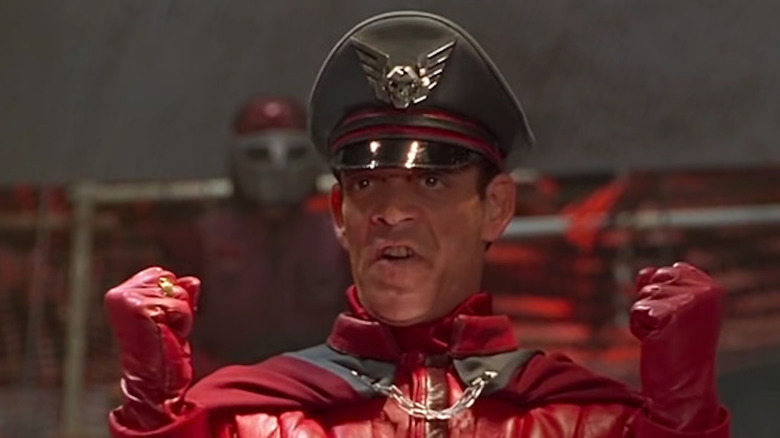The 1994 Street Fighter Movie Is Good, Actually, And Yes, I Want To Fight About It
When Steven E. de Souza embarked on his big-screen adaptation of Capcom's arcade classic "Street Fighter II," the transformative upgrade on the ho-hum original, he painted a fire-engine red target on his back. The A-list action screenwriter of "48 Hrs.," "Commando" and "Die Hard" had more than earned the opportunity to make his directorial debut, but, in 1994, no one took video games seriously as a storytelling medium — and for good reason! Aside from role-playing computer franchises like "Ultima," "The Bard's Tale" and "Final Fantasy," most non-sports-centric games were either side-scrolling quests with the most slender of narratives or button-mashing combat competitions.
"Street Fighter II" fell in the latter camp. No one chugged Mountain Dew until sunrise because they wanted to know M. Bison's backstory; they did so to exert their console-controller primacy over their friends and dormmates. But Capcom's PvP sensation was so wildly popular that the video game company would've been negligent if they didn't explore the property's synergistic potential. A film made sense. Casting an internationally recognizable martial arts star like Jean-Claude Van Damme as the camouflage-clad Major Guile seemed like a masterstroke. Landing an actor of Raul Julia's magnitude for the villainous role of M. Bison was deliriously unthinkable. De Souza was not critically respected (reviewers didn't respect the artistry of '80s and '90s American action cinema until this glorious era was at its end), but those of us who'd grown up watching "Commando" on a pay-cable loop revered his mastery of the crash-boom craft.
Still, no one had any idea what a "Street Fighter" movie should look like or how it should play. The game's color palette was garish, and its unremitting violence cartoonish. "Street Fighter" didn't traffic in the fatality gore of its quarter-swallowing competition "Mortal Kombat." It was endearingly bloodless.
De Souza understood this and delivered a delightfully silly gem.
De Souza treated the material with the lack of reverence it deserved
"Street Fighter" signals its goofily satiric intentions with a "Robocop"-inspired — or is that "Citizen Kane?" — news broadcast that cheekily elucidates M. Bison's authoritarian rule of the fictional Southeast Asian nation of Shadaloo. Guile leads the also-fictional Allied Nations' campaign against Bison's illegitimate power grab, and is so committed to his righteous cause that he commandeers a cable news camera to engage in a technically improbable back-and-forth with the despot.
This is the moment when you must make a decision: this is either off-puttingly unrealistic or awesomely stupid.
Sitting in a Toledo, Ohio theater on opening night, I cheerfully bought all the way in. The flippant demeanor of de Souza's most memorable protagonists — Reggie Hammond, John Matrix, and John McClane — was now governing an entire production. He was paying proper respect to his assignment, which was to wink at his audience: this is a movie based on a video game, and he was not going to imbue a single second of this movie with dramatic gravitas. And he was going to use one of the greatest actors on the planet to bold-underline the sheer ludicrousness of this endeavor.
De Souza reportedly made "Street Fighter" under a mess of pressure, and with a $35 million budget that was siphoned off by Van Damme's $8 million salary. This explains the film's curiously small scale, but excess production value would've diminished its chintzy charm.
A movingly silly swan song for Raul Julia
Though Van Damme is the main attraction for his martial arts mastery, de Souza gift wraps the movie to Julia. And while Julia was battling stomach cancer during the shoot, to which he would succumb two months prior to the film's release, he rises to the occasion in every scene. His best moment finds him taunting Ming-Na Wen's Chun-Li with a brushed-off memory of murdering her father and sacking her hometown. "For you, the day Bison graced your village was the most important day of your life. But for me, it was Tuesday."
A sallow, yet fully engaged Julia might be the primary reason to watch de Souza's "Street Fighter," but there are other pleasures to be found. The combat editing, where match-cuts take us from one fight to another, is ingenious. Graeme Revell's score is perfectly overheated; it belongs to the kind of '50s B-movies de Souza is clearly homaging. And the writing is wonderfully arch. De Souza knows you know you're watching a film based on a narrative-starved video game, so he drops any hint of pretense.
A year later, Paul W.S. Anderson gave serious gamers the no-nonsense PvP adaptation they desired in "Mortal Kombat." It was dark, moody, and stupid in all the wrong ways. It flattered gamers for mistaking their time-wasting passion for something meaningful. De Souza's "Street Fighter" is properly devoid of reverence. It's an insouciant entertainment inspired by corporate decree. It's not the best video game film ever made (that would be Christophe Gans' Fulci-inflected "Silent Hill"), but it's the only movie that successfully parodied the notion of attempting to find drama in pixelated people beating the tar out of each other.
No matter what happens with the inevitable "Street Fighter" adaptations now that Legendary has the rights to the IP, we'll always have "Street Fighter: The Movie."


